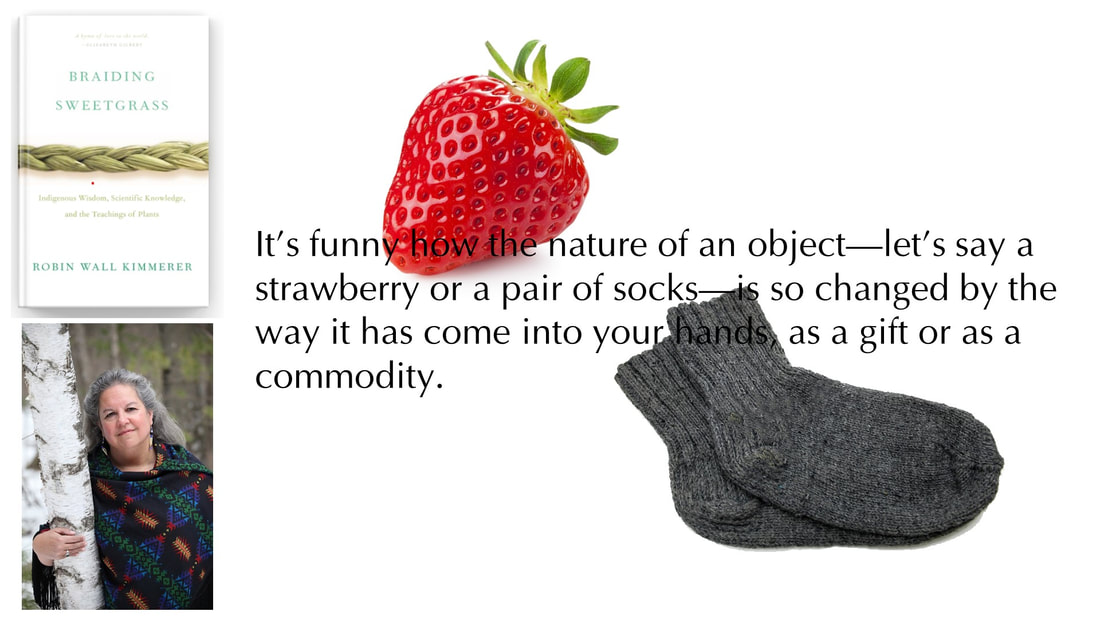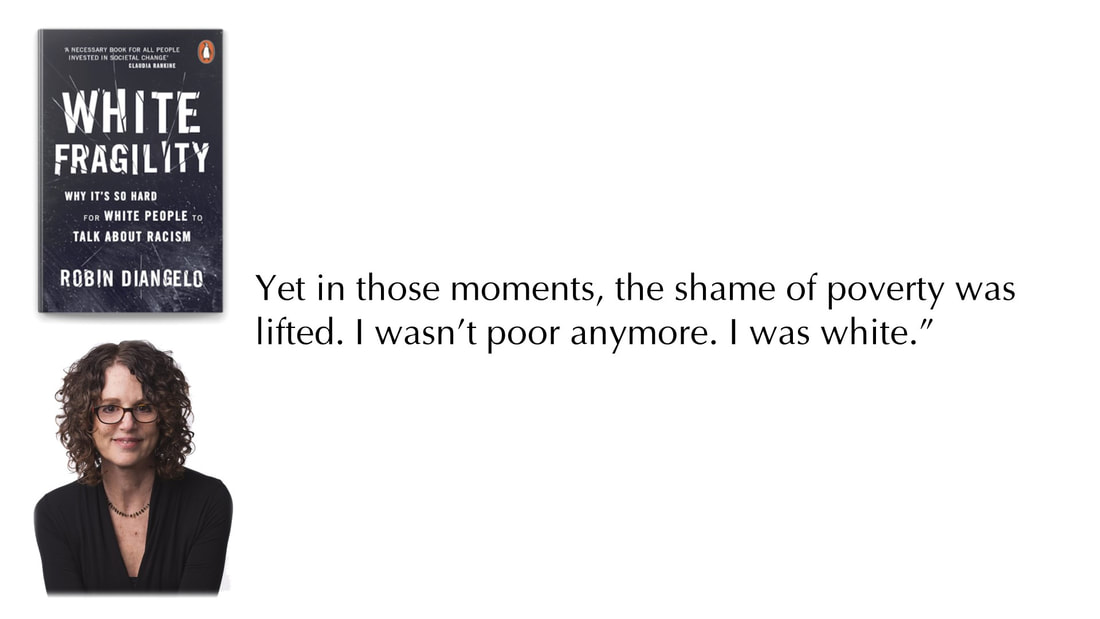Scott Anderson Acts 10:44-48 † Psalm 98 † 1 John 5:1-6 † John 15:9-17 A video version of this sermon can be found here. You likely read the quote from the Robin Wall Kimmerer we included in the invitation to worship. Here it is again, from her book Braiding Sweetgrass: “It’s funny,” she writes, “how the nature of an object—let’s say a strawberry or a pair of socks—is so changed by the way it has come into your hands, as a gift or as a commodity. The pair of wool socks that I buy at the store, red and gray striped, are warm and cozy. I might feel grateful for the sheep that made the wool and the worker who ran the knitting machine. I hope so. But I have no inherent obligation to those socks as a commodity, as private property. There is no bond beyond the politely exchanged “thank yous” with the clerk. I have paid for them and our reciprocity ended the minute I handed her the money. The exchange ends once parity has been established, an equal exchange. They become my property. I don’t write a thank-you note to JCPenney.[i]
1 Comment
Scott AndersonActs 4:5-12 † Psalm 23 † 1 John 3:16-24 † John 10:11-18
A video version of this sermon can be found here. Robin DiAngelo’s family was struggling. She and her two sisters were raised in poverty in the 1960s by their single mom: “…we were flat out.” She says. “We lived in our car. We were not bathed.” DiAngelo is the author of White Fragility, I suspect, one of the most important books of our time. It was clear DiAngelo’s mother was helpless and at her wits end. They had no resources and no help. They were hungry, but here’s the kicker: if she would reach out to take, for example, some food someone had left out, DiAngelo’s mother would stop her: ‘Don’t touch that. You don’t know who touched it, it could have been a colored person.’ ‘Don’t sit there. You don’t know who sat there, it could have been a colored person.’ That moment crystalized something for DiAngelo: The message was clear: If a colored person touched it, it would be dirty. But I was dirty. Yet in those moments, the shame of poverty was lifted. I wasn’t poor anymore. I was white.” Scott AndersonZephaniah 1:7, 12-18 † Psalm 90:1-12 † 1 Thessalonians 5:1-11 † Matthew 25:14-30
A video version of this sermon can be found here. The kingdom of God, the reign of God, the world in which God’s will is done is like this: a man going on a journey summoned his servants and entrusted his considerable riches to them. We’ve talked about this parable before. It is a sticky one—one of those that can be read in multiple ways depending on how you identify the players, depending on the way you read it. And there may be no right answer to it, except the one that gets us closer to the deep truth of God’s life in the world and in us in this moment in time, which is probably the one that disturbs and challenges us the most. I suspect we know the traditional reading. This is a story about the importance of doing something with the gifts and the talents we have been given. And this is true, isn’t it? It is important. The master to whom the talents belong is God, or maybe Jesus, and the servants are the disciples—us, you and me—who take what we’ve been given and use it for good, or don’t perhaps to our peril. Paul kind of sums up this idea in his letter to the Thessalonians: “Encourage one another and build up each other, as indeed you are doing.” Make investments in God’s ways, in other words, and be cautious when God’s ways challenge those ways to which we have grown accustomed. There’s much to be drawn from this, and some difficulties as well. How, for example, do we reconcile this callous or even cruel absentee owner for whom forgiveness seems to be a rare commodity, who seems to take delight in enriching those who are already rich and throwing the one who already had little into the darkness—how do we reconcile this image with the God who in Jesus is love and justice equally? How do we imagine that this one who gave his life for the sake of the world could be so hard-hearted? Scott AndersonAmos 5:18-24 † Psalm 70 † 1 Thessalonians 4:13-18 † Matthew 25:1-13 A video version of this sermon can be found here. Keep awake! That’s the message Jesus draws from this murky story in Matthew right before the parable of the talents which we’ll see next Sunday. There’s all this detail in the story—a bridegroom, but no bride anywhere to be found; lamps (which are really torches) and oil. Five brought oil, the other five didn’t. It’s not that they didn’t bring enough, they just didn’t bring any, or maybe they didn’t have any. And apparently there’s an all-night oil shop open somewhere down the road. All ten bridesmaids--virgins actually, fall asleep, by the way. All of them. The bridegroom arrives late, seriously late, and five make it into the party and five are shut out. And Jesus tells his listeners to keep awake. Scott AndersonIsaiah 45:1-7 † Psalm 96:1-13 † 1 Thessalonians 1:1-10 † Matthew 22:15-22
A video version of this sermon can be found in the context of online worship here. We know from the outset that there is no good will here. Matthew tells us at the beginning that the Pharisees are out to entrap Jesus. They are looking to take him down. They are not seeking truth. They are long past that point. They are out for blood. And we know well enough they will soon get it. And they form a strange alliance to set their trap. Now, we don’t know much about the Herodians in the Matthew text, but their name suggests they are loyal to Herod. They are not religious; they are political—Roman partisans. They see the heavy hand of Roman rule on the Jewish people as justified, which puts them in opposition to the large population of Jerusalem that bristled under ongoing Roman occupation and rose up in popular armed rebellions on both sides of this story. So let’s just say there is some tension here. I suppose we might know a thing or two about that. Scott AndersonJeremiah 20:7-13 † Psalm 69:7-18 † Romans 6:1-11 † Matthew 10:24-39
A video of this meditation can be found here. The Jeremiah text caught me this week. I’m sure it’s the moment, the week, the flood of events that have turned our hearts and our attention toward realities that have been in plain sight for centuries and yet less noticed by me, a white male with layers of privilege that buffer my experience. Perhaps you too. My mother never gave me “the talk.” There was no need. I remember, in fact, a night in Marietta Georgia while I was a seminary student. Barb and I were out with some friends—a professor of mine, actually and his wife. I was driving. It’s a blur almost 30 years ago now. I took a right, I think. And then flashing blue lights. Then that feeling in the pit of my stomach. We pulled over, and looking back now, it’s almost as if I was possessed. I was obstinate—I mean more than usual, if you can believe that! Rude even, to the officer. I don’t know why. I can’t even explain it. Even in the moment I had the feeling of floating outside of my body, watching myself, unable to control what I was saying. Perhaps I was embarrassed in front of these friends. There’s no excuse for it. Here’s the thing, though. The officer was professional. He responded in measured tones. The encounter ended, and we were on our way. Had a few factors been different, who knows what might have happened? A black mother knows. Many black mothers know all too well. I suspect, Jeremiah knows. …whenever I speak, I must cry out, I must shout, “Violence and destruction! Scott AndersonGenesis 1:1-2:4a † Psalm 8 † 2 Corinthians 13:11-12 † Matthew 28:16-20 You may want to grab onto something and hold on for the next couple of minutes. This may be a bumpy ride, but worth it, I hope. We’ve been talking a lot these past few weeks since the death of George Floyd about systemic racism, and systems of oppression and privilege. This language may be new for some of us, and old hat for others, but I suspect it is a value for all of us, every now and then, to remember our story in the United States as one way of understanding these systems that support white supremacy. Here we go.[i] Scott AndersonActs 2:14a, 36-41 † Psalm 116:1-4, 12-19 † 1 Peter 1:17-23 † Luke 24:13-35 For over 1400 days—nearly four years—between 1992 and 1996, the city of Sarajevo was under siege. One study of the survivors found that many had developed a super-heightened sense of spatial awareness—a skill for evading bullets or bombs, a skill that they carried with them throughout their lives. “People, during times of prolonged, radical change, end up changing,” said the study’s author[i] in an article this week that takes an early run at how we might be changed on the other side of this pandemic. It makes sense. We are an adaptable species. We grow and change according to requirements on the ground, in the environment, or just at home in these times. Not surprisingly, studies from previous outbreaks—SARS, Ebola and swine flu—showed almost universal spikes in anxiety, depression and anger. But they also found that people acted to regain a sense of autonomy and control. People worked on their diet. They read more news. They made art. Who knows, maybe they made masks. You may remember those Sarajevo roses we showed you some months ago in the “before times.” Scott AndersonActs 2:14a, 22-32 † Psalm 16 † 1 Peter 1:3-9 † John 20:19-31
A video version is available here. One of my favorite TV shows was Modern Family. A few weeks ago it wrapped its final episode after eleven seasons. At its best, the show combined great slapstick and physical comedy with some beautiful and, sometimes, even inspiring sentiment. One memorable episode way back in season five was titled “Australia.” Phil Dunphy went to Australia for a vacation because he had been conceived there, and his mother had always wanted him to go and visit. He’s finally decided to go fulfill her dying wish, and the rest of the family decides to tag along. The problem is that things don’t go very well for Phil. As soon as they arrive, he has an allergic reaction to a local fruit. Then he gets stung by a jelly fish. Then, in one of the best physical bits I’ve seen in a long time, he gets punched in the eye by a kangaroo that he thinks is the spirit of his mother. That’s worth the half-hour all by itself. Scott AndersonMatthew 21:1-11 † Psalm 118:1-2, 19-29
I suspect it is good for us to remember, especially on a day like today, that where we start is not where we end. It’s true of this infection curve that has become so ubiquitous to our Facebook feeds and news casts; it’s true of the limitations we are being asked to put on our movements and interactions; and it is true of this story of a parade and the tightly-packed cheering, chanting, dizzy crowd that may cause you to squirm as much as it does me, alert and militant in our commitment to social distancing and to the prevention of spreading this infection to our neighbors and loved ones. But here we are at the beginning of a Holy Week that is going to get even more crowded and super-heated than it already is here among the palms and coats and shouts, before we find ourselves just a week from now amidst the quiet of dawn and a garden and a tomb that is empty of even its one quarantined resident. |
St. Andrew SermonsCategories
All
|



 RSS Feed
RSS Feed